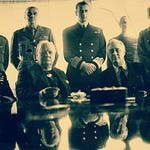Originally published on April 22, 2015 (Episode 12)
Introduction
Clio the goddess of history has a palace in which there are many rooms. This conversation inaugurates a series exploring the sub-disciplines of history—what they are, how they emerged, and why they matter. On Earth Day 2015, it’s appropriate to begin with environmental history.
Brian Leach joins me to introduce a field that investigates how humans have shaped, and been shaped by, the natural world. From material and political histories to the study of culture, disease, and climate, environmental history connects seemingly disparate areas into a deeply interconnected story.
About the Guest
Brian J. Leech is Associate Professor and Chair of History at Augustana College in Rock Island, Illinois, where he also serves as Chair of Austin E. Knowlton Honors Program, Co-Coordinator of Food Studies. His work explores the intersections of environment, technology, and society.
For Further Investigation
Representative works in key areas of environmental history:
Donald Worster, Dust Bowl (1979); Rivers of Empire (1986)
Samuel P. Hays, Conservation and the Gospel of Efficiency (1959)
Leo Marx, The Machine in the Garden (1964)
Jennifer Price, Flight Maps (1999)
Mark Fiege, Irrigated Eden (1999)
Karl Jacoby, Crimes against Nature (2001)
Judith Carney, Black Rice (2001)
John Soluri, Banana Cultures (2005)
Linda Nash, Inescapable Ecologies (2006)
Thomas G. Andrews, Killing for Coal (2008)
Ted Steinberg, Acts of God (2006)
Kate Brown, Plutopia (2013)
Alan Mikhail, on volcanoes and the Ottoman Empire
💬 Listen & Discuss
What does it mean to put the environment at the center of history? Does it change how we see politics, economics, and even culture? Share your thoughts below, and send this episode to someone curious about the environment beyond recycling occasionally.











